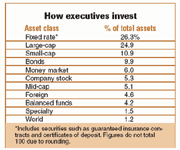Article
UPDATE
On finance and practice

A pretty investment picture Strong auction sales last fall pushed earnings from art investments to 13 percent in 2004, besting the 10.9 percent returned by the S&P 500 Stock Index, says the Mei Moses All Art Index. Pre-1950 American art did the best, returning 25.2 percent, according to the index, which tracks the sales histories of more than 8,000 paintings, drawings, and sculptures. Impressionist and modern paintings returned 14.3 percent, while old masters lagged at 1.8 percent. Over the past five years, art investments gave back a 7.3 percent compound annual return, compared to the 2.4 percent loss posted by the S&P 500. The index was created by two professors at New York University's Stern School of Business.

Mutual fund flippers may pay Beginning late next year, mutual fund companies can levy a redemption fee on investors who sell their shares within seven days of purchase. The new SEC rule limits fees to 2 percent or less of the redeemed shares' value. Short-term trading increases costs to the fund companies and, in turn, to long-term investors.
The rule doesn't apply to money market or exchange-traded funds. Last year, the SEC had proposed a mandatory fee for all shares redeemed within five days of purchase, but decided that fees shouldn't be forced on funds that encourage active trading.





